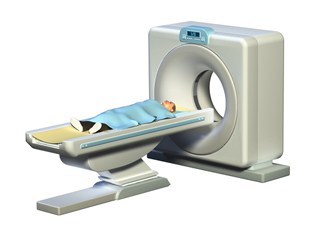CT Colonoscopy Fact Sheet
An estimated one in 20 adults are affected by colon cancer. Getting screened regularly is the best thing people can do to lower their chances of developing cancer of the colon. Small outgrowths on the colon’s lining called polyps are the cause of colon cancer. Many of these growths are harmless, but as time passes they can become cancerous. A computerized tomographic (CT) colonoscopy is one of the screening tests that can detect polyps and other abnormalities.
Early detection of pre-cancerous lesions significantly increases survival rate. Expert groups like the American Cancer Society recommend CT colonoscopies as screening tests for cancer, particularly for people over age 50. A CT colonoscopy, also called a virtual colonoscopy or CT colonography, is an alternative to a standard optical colonoscopy that is less invasive.
Overview of the Test
A CT colonoscopy uses a machine called a CT scanner that takes pictures of the colon and uses special 3-D computer software to produce detailed images of the colon’s walls. The images reveal polyps and signs of cancer. If growths show up, a traditional colonoscopy can take pictures of the entire colon. Doctors may follow up with a biopsy.
A CT colonoscopy provides doctors with images from various angles to create a complete picture of the inside of the large intestine. Doctors review both 2-D and 3-D images of the pelvis and abdomen. This test is preferable to a traditional colonoscopy in that a scope does not need to be physically inserted into the colon.
If polyps are found in the early stages of growth, surgeons can take them out before they become cancerous.
Evidence and Science behind the Test
CT colonoscopies have advantages over traditional colonoscopies, but when first introduced people were unsure if they would work as well. Laxatives are not needed and the procedure is non-invasive whereas a colonoscopy is. Research has been done to determine whether a CT colonoscopy is as useful as a traditional colonoscopy as a cancer screening test.
A study conducted at the University of California, San Francisco VA Medical Center and Massachusetts General Hospital found that a CT colonoscopy is as accurate as a traditional colonoscopy. The study was published in the Annals of Internal Medicine in 2012.
Another study found that people preferred a CT colonoscopy over a traditional colonoscopy 5.5 to 1. The study participants had gone through both types of tests. They said that if they had to choose to have one or the other in the future, they would pick a CT colonoscopy at a ratio of 8 to 1.2.
How it is done
A CT colonoscopy involves low doses of radiation during a scan of the area around the colon. Patients begin lying on an exam table, typically on their backs, but technologists may ask for different positions. A small tube goes into the rectum so that a doctor can pump air into the colon. This is to ensure the clearest picture possible. The tube only goes in about two inches, unlike in a traditional colonoscopy whereby an endoscope tube goes all the way into the colon.
The table then moves through the scanner machine. People generally move into another position and then scanned a second time. The tube is taken out once scanning is complete. The whole test takes only around 15 minutes.
Who does it?
A technologist and imaging physician usually work together to perform this test.
Cost
Some insurance companies cover CT colonoscopies. The cost then is usually negligible. However, people who must pay out of pocket usually get a bill for around $400 to $800 for the test. This is much cheaper than the cost of a traditional colonoscopy, which could be closer to $1,500 to $3,000 without insurance. Medicare may cover a traditional colonoscopy but not a virtual one.
When and How Often?
Men and women should get screened for cancer of the colon when they reach age 50. A CT colonoscopy should be done every five years. Traditional colonoscopies are recommended every 10 years, but because they are more invasive and expensive, most people would prefer virtual colonoscopies at shorter intervals.
People who have a family history of colon cancer should begin screening at a younger age, usually 40 is ideal. These people may need testing more frequently. Anyone with an increased risk may also need to be tested more frequently and from a younger age.
Issues
A CT colonoscopy is a very safe procedure. In very few cases, an injury to the colon or bowel can occur when air is pumped into the colon. Women who are pregnant, children, and people who have certain conditions, such as a small bowel obstruction, recent colorectal surgery, or diverticulitis, should not have this test.
References
- University of California, San Francisco
- National Digestive Diseases Information Clearinghouse
- RadiologyInfo.org
- Salix Pharmaceuticals
- Fast Living Slow Ageing; Kate Marie and Christopher Thomas; 2009
Last reviewed 26/Feb/2014
